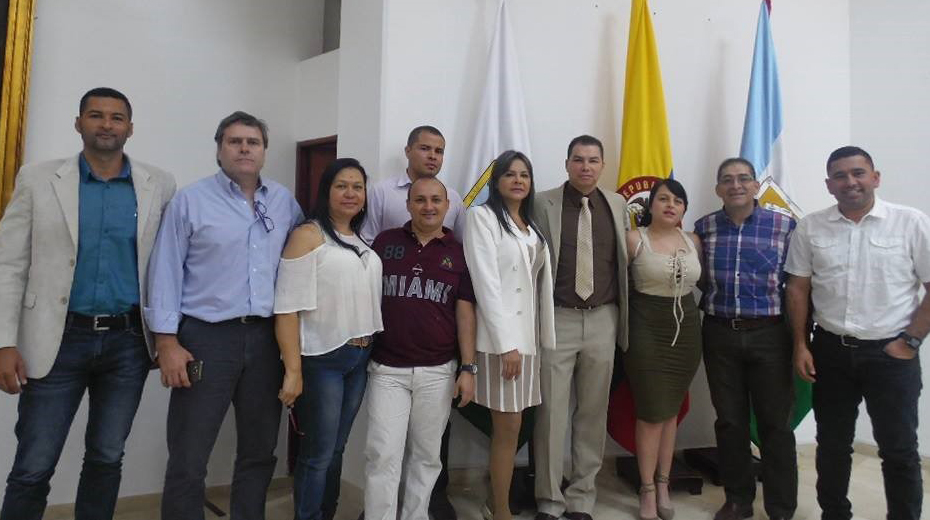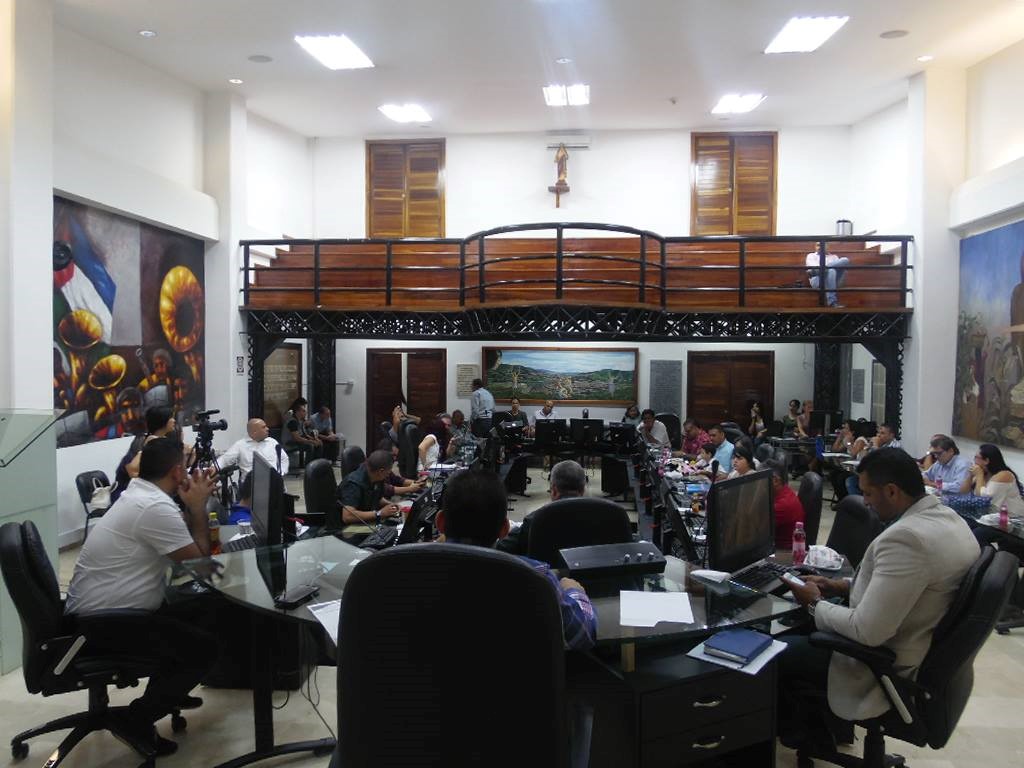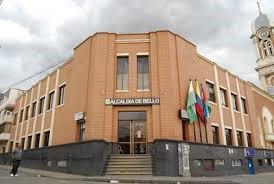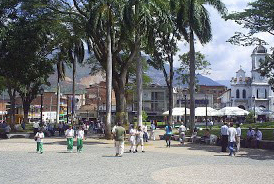Local and regional government trade unions of Colombia negotiate tripartite public policy agreement on decent work in the municipality of Bello

During three rounds of collective bargaining (2012, 2016 and 2017), the National Union of Government Workers (Sindicato Nacional de Trabajadores Estatales – SINTRAESTATALES), affiliated to PSI and representing public sector workers in Colombia, including local and regional/municipal government workers, has consistently requested the Bello municipal government (Antioquia Department) to introduce public policies on decent work, not only in local government but also in the municipality’s entire private sector. The union believes the measure is necessary to promote work that is decent, to formalise employment and to promote inclusive economic development in the local community.
 |
|---|
Some of those present and main trade union actors at the approval of the Agreement on Public Policies on Dignified and Decent Work in the Municipality of Bello: Darío Restrepo, President of SINTRAESTATALES Colombia and a member of the CONTRAM/ISP/AMERICAS executive board; Adriana Mesa, President of the SINTRAESTATALES branch in Bello; Juan Fernando Arango, Bello Municipal Economic Development Officer; Estela Suárez, councillor and project rapporteur; Sergio Velásquez, Bello Municipal Economic Development Officer, Bello; Yessica J. Arango, councillor and project rapporteur; Jesús Octavio Jiménez, President of the Municipal Council. Bello, Antioquia,. 18 April 2017. |
The workers’ repeated requests led to the issue being raised in the Municipal Development Plan of June 2016, which in turn led to the creation of a local tripartite negotiating committee. After eight months of talks, the parties reached a tripartite “Agreement on Dignified and Decent Work in the Municipality of Bello.
Local tripartite agreements on decent work are an important tool for helping local and regional authorities to comply with their duty to recognise the collective bargaining rights of local government workers. They also fulfil commitments made by governments to the ILO Decent Work Agenda as well as promote the creation of quality jobs and equitable local economic development, as set out in the New Urban Agenda adopted at the Habitat III meeting in Quito, Ecuador, in October 2016.
PSI asked Darío Restrepo Valencia, national president of SINTRAESTATALES and Labour and Trade Union Rights Officer for CONTRAM-ISP-AMÉRICAS, how this positive step for the Colombian trade union movement came about; what lessons we can learn from this experience; how we can replicate and share it with the Global LRG/Municipal Workers’ Network and what challenges lie ahead.
PSI: Who took the initiative to negotiate an agreement on developing a public policy on decent work in the Bello municipality and how did events unfold?
DRV: In Colombia, the Constitution of 1991 provided for the creation of a tripartite “Permanent Negotiating Commission on Pay and Labour Policies”. It aimed to encourage good labour relations, help solve labour disputes and promote the negotiation of pay and labour policies. Although the commission was created in 1991 and regulated in 1996, it practically ceased to operate. At the national public sector bargaining round on 16 May 2013, workers’ representatives asked the national government to revive it and encourage it to address the issue of formalising jobs and change implementation and monitoring policies and instruments relating to the public sector workforce. In addition, in 2015, workers called for a National Pact on Dignified and Decent Work. The government went on to approve Act 1753 of 2015, containing the National Development Plan 2014-2018. Under the slogan of “Everybody for a new country”, it said the following:
“Article 74. National decent work policy. The national government, through the labour ministry, shall adopt a national decent work policy to promote job creation, formalise employment and protect public and private sector workers. Local government authorities shall include decent work policies in their development plans in accordance with labour ministry guidelines. The national government shall also set rules to ensure that companies comply fully with labour standards on outsourcing. The national government shall also ensure that permanent activities for which public authorities are responsible shall be performed by directly employed workers, with the exceptions set out in the Act.
Article 75. Strengthening social dialogue and conciliation. The national government, through the labour ministry, shall promote territorial programmes that strengthen social dialogue and labour conciliation, the prevalence of basic labour rights and sustainability of companies.”
Following on from these national level agreements, the Bello branch of SINTRAESTATALES, during the last three rounds of collective bargaining (2012, 2016 and 2017), has consistently requested the Bello municipal government to introduce public policies on decent work, not only in local government but also in the municipality’s entire private sector.
So it was that, in June 2016, Bello’s municipal administration convened tripartite talks. We worked together over the next eight months to get to where we are today, with Municipal Agreement 005 of 18 April 2017 "which introduces public policies to create jobs and ensure the right to dignified and decent work in Bello".
 |
|---|
Plenary meeting of the Bello Municipal Council, Antioquia, Colombia, during the Second Debate on the draft agreement on public policy to create jobs and ensure the right to dignified and decent work in Bello municipality. 18 April 2017. |
PSI: Who are the social partners in this agreement (trade unions, employers and government) and how did the negotiations proceed? What were the main interests and how did the parties manage to reach agreement?
DRV: The tripartite talks, which went under the name of “Permanent Forum on Social Dialogue and Conciliation on Pay Policy in Bello Municipality” were very representative and included the following social actors: the Bello municipal administration (Economic Development Department, Labour Ministry, Antioquia Provincial Administration, some private sector employer federations (such as the Chamber of Commerce and Family Compensation Funds), the Central Unitaria de Trabajadores (CUT), the Bello branch of SINTRAESTATALES, some social organisations (local administrative boards, community organisations, neighbourhood committees), representatives of vulnerable groups (women, LGBTI, the disabled, youth, peasants) and some higher education institutions (SENA, Politécnico Marco Fidel Suárez).
PSI: What are the most innovative and interesting parts of this agreement? Who is responsible for it and what are the monitoring mechanisms? How is the plan funded?
DRV: A section in the agreement, entitled “Investment Programmes on Dignified and Decent Work”, redirected municipal projects and investments towards planning, encouraging and generating new sources of decent work by creating new companies and strengthening existing ones. These programmes will have also have an influence on formalising jobs, reducing unemployment, improving working conditions and reducing poverty and inequality. The deadline agreed for issuing regulations for the agreement is only six months and so we need to start immediately. Each and every one of the parties involved in this agreement has a duty to implement it. Monitoring and supervision of the agreement will rest mainly with the municipal administration, which will prepare annual reports on compliance. On funding, it was decided not to “tie” it to a specific source and to provide more details in the regulations.
 |
|
|---|---|
Gaspar de Rodas Building, Municipal Town Hall in the main square. |
Santander Park. Bello’s central square. |
PSI: What is the role of the municipal trade unions in developing policies on decent work and local economic development?
DRV: Local government workers’ unions in Colombia play a vital role in developing public policies on quality employment and local economic development. It is not the employers or local governments that take the initiative to improve working conditions in both the public and private sectors. It is the workers who fight to improve their working conditions so they can have a fair, equitable and dignified life for their families. For us, employees of the Bello municipal administration and, in particular, for those of us who, as local trade union leaders, represent SINTRAESTATALES members, this agreement represents a big step towards securing recognition of the labour rights of public sector workers, but also, of private sector workers in our municipality.
Of course, we cannot say we have already won the battle. We now face the challenge of ensuring that the general and abstract framework set out in the agreement is regulated in such a way that it leads to real and effective policies. This is a major challenge, but we are ready and willing to face it and move forward. We have already taken the first step and we will not fail to live up to our duties and responsibilities as trade union leaders. In any case, the agreement gives us a tool with which to demand respect for labour rights and the introduction and enforcement of dignified and fair working conditions. Finally, from a personal point of view, I think we are doing our job as well as we possibly can in these particular local circumstances. We are complying with the ILO’s global proposals on the fight for decent work for the most disadvantaged. We are putting into practice PSI’s international guidelines and we are fulfilling the commitments we made in the Action Plan for the municipal sector: CONTRAM/PSI/AMERICAS.
 |
|---|
Bello was founded in 1676 and achieved municipal status in 1913. It is 149 sq km in area and has a population of more than 700,000. It is located at an altitude of 1,450 metres above sea level and is 8 km from the city of Medellin, which is the departmental capital of Antioquia. Average temperature is 22°C. |
PSI: How can this experience be replicated in other municipalities in Colombia and the rest of the world and what advice would you give to other municipal and local unions about attempting to do the same thing?
DRV: In Colombia, as far as we know, this is only the third attempt by a local government to introduce public policies on dignified and decent work. There were recent experiences in the country’s capital, Bogota, and in Medellin, Antioquia’s departmental capital.
The advice I would give to municipal trade unions is, every time they put forward a list of demands, they should consistently and firmly push local and regional governments to introduce genuine public policies on decent work as a way not only of improving the working and living conditions of employees and their families but also as a way of promoting local and regional economic development. In countries and municipalities where unfortunately the conditions are not ripe for making progress through collective bargaining, they should try conciliation and social dialogue, in order to build political will among the authorities, while making sure that their own trade unions also have that same political will to make progress.
PSI: Do you think that this kind of agreement has a role to play in the peace process in Colombia?
DRV: Yes, of course. The national labour ministry required the teams that negotiated our agreement and presented it to Bello’s municipal council to ensure that the resulting dignified and decent work policy made provision for social investments to encourage the formalisation of jobs in the rural sector, agricultural production, the solidarity and cooperative economy. Also that it should provide technical assistance in the post-conflict situation in this sector, in accordance with what was agreed by the national government and the FARC in their negotiations in Havana, Cuba.
That’s what we put in the draft agreement and that’s what is there in the agreement approved by the municipal council. We only made one change to the draft, which we thought was relevant and necessary, and that was to use the term post-agreement rather than post-conflict. Although the parties finally signed an agreement, the armed conflict and political and social violence in Colombia has unfortunately left us with many difficult issues and actors to deal with. Social and violent conflict is still not over in Colombia.
Article prepared with the assistance of SINTRAESTATALES
Download:


